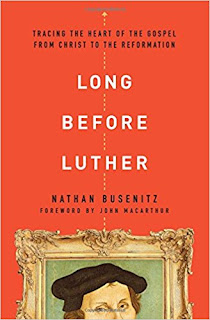AUTHOR: Nathan Busenitz
PUBLISHER: Chicago, IL: Moody Publishers, 2017, (256 pages).
October 31st, 2017 is the 500th Anniversary of that great moment when the famous reformer, Martin Luther boldly challenged the Roman Church establishment to a theological debate. Out of this event arose the five solas of the Reformation: Sola Scriptura; Sola Christus; Sola Fide; Sola Gratia; Sola Deo Gloria. While these fundamental tenets of the Christian faith have been elevated as the Reformation Creeds by many, is it really true that the Reformation started all these? Absolutely not, so argues author Nathan Busenitz. In fact, it all began in Scripture itself with pre-Reformation figures already talking about it long before Luther, hence the title. Put it another way, Christianity did not just began 500 years ago. Its origins are over 2000 years ago starting with Christ and several church fathers.
Using "sola fide" as an example, it does not begin with Luther. It began with Christ. He differs sharply from the renowned theologian Alister McGrath by arguing that "sola fide" began 2000 years ago, and not after the Reformation. In this book, Busenitz is essentially arguing against McGrath's three views of justification:
- That the Reformers taught "forensic" rather than "formative" justification
- That the Reformers distinguished the doctrines of justification from regeneration and progressive sanctification
- That the Reformers taught "imputed righteousness" instead of "infused righteousness."
This book is a fresh look at the Reformation teachings and reminds us not to over-glorify the achievements of the early reformers for they were not the original proponents of the five solas of the Reformation. They renewed the emphasis on the fundamentals of the Christian faith, especially after many decades of Roman Catholic Church teachings that had eroded these basics. Perhaps, the Reformers' work was more of a reaction against the Roman Church rather than some brand new set of teachings. Busenitz has shown us that the patristics taught the same things too, even though there are some differences. Readers will be encouraged to know that there is ample historical continuity of the faith. We give thanks to God for enabling these faithful servants who had stood up and fought successfully to maintain the purity of the gospel. With each generation, people change. Cultures change. Contexts change, but the Word of God stands forever. Long before Luther, there were the Church fathers like Augustine, Clement, Cyril, and so on. Long before Augustine were the faithful testimonies of the Early Church and the first disciples. It can only be surmised that there is one constant guide through it all: The Holy Spirit.
Nathan Busenitz is the Dean of Faculty and Assistant Professor of Theology at The Master's Seminary. He has also served as a full-time member of the pastoral staff at Grace Community Church.
Rating: 4.5 stars of 5.
conrade
This book has been provided courtesy of Moody Publishers without requiring a positive review. All opinions offered above are mine unless otherwise stated or implied.

Busientiz is a major historical revisionist. He even refuses to admit that Justin Martyr taught baptismal regeneration! I wonder if a protestant minister like you think baptism is necessary for salvation and will even damn infants if not done on them
ReplyDelete